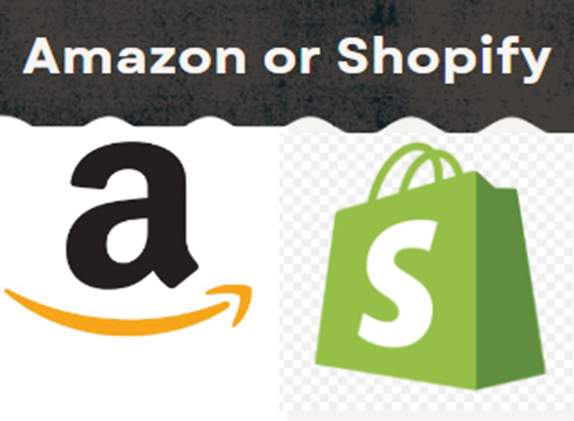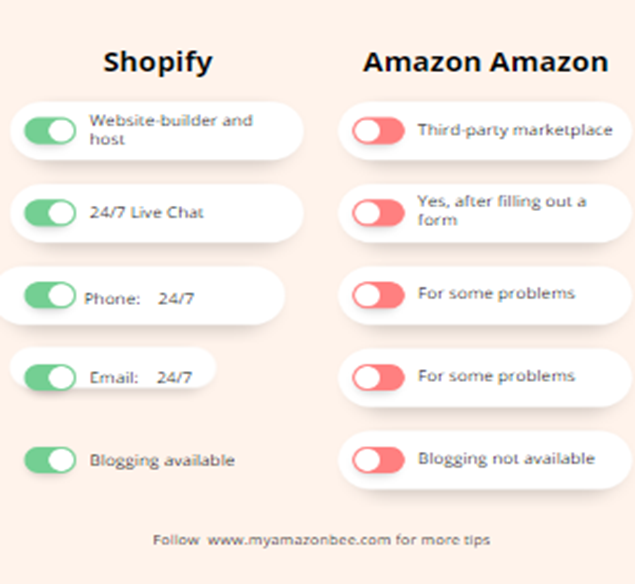“Amazon FBA VS SHOPIFY which one to start in 2024?”
Confused between Shopify Vs Amazon? Read this blog post to know which platform is better for you. In this post, I will compare both Amazon and Shopify from various aspects.
Customers’ shopping habits have changed from offline to online in the past few years. Today, more and more customers are shopping online than ever before! Thanks to eCommerce platforms such as Shopify and online marketplaces such as Amazon that makes it possible for the business to connect with their customers online.
The eCommerce marketing growing, and that too, rapidly! One report by Statista revealed that retail eCommerce sales are expected to reach a whopping $7.4 trillion by 2025. If you are also a business owner looking to dive into this online selling race, then there are multiple ways to do that. Amazon and Shopify are two of the most popular names amongst online sellers that you might have heard of thousands of times before.
If you are a business enthusiast confused between these two platforms to start selling your products online, then reading this blog post may help you. In this post, I will point out all the major differences between Shopify and Amazon, which will help you choose the right selling platform for you.

Table of Contents
· What is the Difference between Shopify and Amazon?
· Factors to Consider in 2024
· Ease of Use
· Autonomy
· Design Flexibility
· Tools And Features
· Attracting Customers
· Support
· Cost
· Competition and Market Reach
· Amazon FBA vs Shopify: The Biggest Pros and Cons
· Amazon FBA Pros and Cons
· Shopify FBA Pros and Cons
· Amazon FBA VS SHOPIFY: Which is Best
What is the Difference between Shopify and Amazon?
Shopify and Amazon both are the best of their kind! One is a self-hosted eCommerce platform that allows online eCommerce store creation, while the other is a leading online marketplace. Let’s consider having a look at the key difference between Amazon and Shopify.
In some instances, Shopify and Amazon seem to be similar. But they are actually not!
Let’s compare Amazon and Shopify from various aspects and figure out the key differences.

Factors to Consider in 2024:
1) Ease of Use
The store owners can easily start selling online on Amazon by setting up their accounts and adding product details. Amazon is a leading eCommerce marketplace and has a wide customer base with its global popularity. The platform allows businesses to start selling their products to global customers using a few easy steps. Moreover, the order fulfillment facility is also provided to the businesses by Amazon, making the operations smoother.
On the other hand, Shopify allows the creation of a self-hosted eCommerce store, which may require a custom domain, website design, and a lot more stuff to get the products online. Apart from that, it can also be comparatively challenging for the business to handle the orders, shipments, and inventory for the orders placed through Shopify.
Selling online is comparatively easy on Amazon as compared to Shopify. Therefore, Amazon clearly beats Shopify when it comes to business easiness.
2) Autonomy
Without a doubt, Shopify is the winner here. Since you own your own e-commerce store, that also means you have autonomy.
As long as you pay your monthly fees, your autonomy on Shopify will always belong to you without any external interference. And, you have full hands of self-control here, whether is your store design, products you are selling, apps you are using, etc.
Amazon on the other hand as I mentioned before doesn’t have much autonomy here. Thus, you aren’t using your own website or designing it according to your preferences. The only thing you have control of is your product.
3) Design Flexibility
A store’s design plays a vital role in branding and also affects the user experience of the customers. It is essential to have a store design that aligns with your brand and the products that you are selling.
Amazon is an online store that enables the company to sell goods to clients all over the world. Businesses on Amazon have no say over how their products are presented to customers or how they look and feel. Because of this, Amazon is a less desirable platform if your goal is to establish a long-term brand.
On the other hand, Shopify allows creating an online store from scratch and the store owner can have complete control over the look and feel of the store. Moreover, there are plenty of paid and free Shopify themes available on the store that give more power to the store owners to design their store.
Therefore, in terms and design flexibility, Shopify clearly defeats Amazon.
4) Tools And Features
The eCommerce tools and features are crucial elements that need to be taken into consideration. Amazon is built for the sellers to sell online and the buyers to purchase products from them. It empowers businesses with essential selling tools and features that make online selling easier. Some of the notable features include email notifications, gift options, multiple-user access, business reports, custom promotions, etc. Moreover, Amazon also takes care of the order fulfillment part and delivers the products to the end customer from the seller, so that businesses do not have to worry about the shipping stuff.
Shopify also comes with plenty of essential online selling tools and functionalities such as inventory management, automated tax calculator, abandoned cart recovery, etc. Moreover, it also allows businesses to add more features and functionalities through the Shopify Apps available on the store.
Therefore, both Shopify and Amazon have come with great tools and features. However, Shopify gets an edge when it comes to custom functionalities and features through its apps.

5) Attracting Customers
With intense competition in the eCommerce world, it is a bit challenging to attract buyers. This is where Amazon comes into the picture! Amazon has millions of customers and does not require much marketing effort. But the only disadvantage is that amongst the millions of visitors, it is essential to get your products instead of your competitors. The competition on Amazon is pretty much more.
Shopify does not have a wide customer base and is required to create its own brand identity. Continuous marketing efforts should be made to increase your customer base.
Hence, Shopify is the best option that can help you every step of the way.
6) Support
Shopify provides excellent customer service; if you have any questions, you can reach out to Shopify experts by contacting Shopify support. You can also use Shopify documents or video tutorials to find the answers to your questions. Furthermore, you can contact the support team at any time of day or night by phone, email, or live chat, and they will respond to you quickly.
Thus, Shopify is provided with multiple options and even offers flexible support options as compared to Amazon.
7) Cost
When deciding between Shopify and Amazon, fees are a crucial consideration. You must choose between individual and professional pricing plans to begin selling on Amazon. On the other hand, the professional plan costs $39.99 per month, and the individual plan starts at $0.99 for each unit sold. Depending on the category, Amazon may also receive a referral fee for each and every item that is sold.
For a successful eCommerce business, it must help provide great value and gain profits. Generally, Shopify has three main pricing plans: Basic plan at $29 per month, Shopify plan at $79 per month, and Advanced Shopify plan at $299 per month. You will not be provided with the reports for the basic plan and are required to pay extra charges for using paid apps.
Here, Amazon is quite affordable, scalable, and transparent with its pricing in comparison to Shopify.
8) Competition and Market Reach
Another critical factor to consider is the level of competition and market reach on each platform. Amazon has millions of active users and is one of the biggest online retailers in the world. This vast customer base can be a significant advantage for sellers on Amazon FBA, as it provides immediate access to a broad audience. However, it also means that competition among sellers is intense, and it can be challenging to stand out in such a crowded marketplace.
Shopify, on the other hand, doesn’t come with built-in access to a vast customer base like Amazon. When you choose Shopify, you’ll need to invest in marketing and customer acquisition to drive traffic to your store. While this requires additional effort, it also means that you have more control over the type of customers you attract and how you engage with them.

Amazon FBA vs Shopify: The Biggest Pros and Cons
All e-commerce solutions have pros and cons to consider. For instance, while Shopify gives you a comprehensive platform for building your online presence, you won’t have access to the existing consumers on Amazon, or the impressive Prime delivery options.
Alternatively, with an Amazon store, the fees you’ll pay for fulfillment can be complex to understand, and you have less control over your branding.
Amazon FBA Pros and Cons
For beginners getting started in the online world, we consider Amazon FBA to be an easy, attractive, and straightforward choice. You can create an Amazon store with minimal effort, access an existing audience of buyers on the Amazon marketplace, and leverage exceptional fulfillment support.
However, there are still some downsides, from complex (and sometimes expensive) fulfillment fees to limitations on what you can sell.
Shopify Fulfillment Pros and Cons
Perhaps the biggest benefit of choosing Shopify for your online store and fulfillment needs is that you get to build a comprehensive online presence. You’ll have full access to all of Shopify’s templates and tools for building an impressive online store.
Plus, you can connect your Shopify store to social media channels, and marketplaces like Amazon and eBay to increase your sales. You can even sell offline with Shopify POS, and leverage third-party drop shipping and POD (Proof of Delivery) tools.
Amazon FBA VS SHOPIFY: Which is Best?
Ultimately, your decision of whether to use Shopify or Amazon FBA will all depend on your business model and strategy.
Shopify pricing plans can be higher for small business owners and startups, but you do get more control over your e-commerce store and customer experience.
Amazon has lower pricing plans, and access to an existing audience, as well as plenty of great tools in seller central.
However, you’ll have fewer ecommerce tools to work with, and less control over your products. Remember, you can always combine your ecommerce store with Amazon FBA, by using the sales channel options within Shopify for omnichannel selling.
This might be the best option for entrepreneurs who want to increase revenue with Amazon sales, while still maintaining control over their own ecommerce website.
Keep in mind that every platform has advantages and disadvantages. In 2024, the competitive world of e-commerce demands that you make decisions based on a thorough analysis of your business needs, market dynamics, and long-term goals.
Ready to see similar Strategies for your Amazon business?
“ Grow Your Business With My Amazon Bee! “
My Amazon Bee is an Amazon agency that has been working for almost 10 years in Amazon PPC Management, Inventory Management, Listing Creation & Optimization, Product Hunting, and Keyword Research.
#AmazonSuccess #MyAmazonBee #EcommerceExcellence #bestppcservices #bestamazonppcservicesprovider #bestppcmanagementservices #amazonppcservices #bestamazonppcagency #bestppcagency #bestppcservices #bestamazonppcservicesprovider #bestppcmanagementservices #amazonppcservices #bestamazonppcagency #bestppcagency #myamazonbee #ppcmanagementagencystokeontrent #amazonmarketingagencystoke #adwordsmanagementstoke #digitalmarketingagency #amazonbee #ppcmanagementcompanystokeontrent #marketingagency #e-commerceagency #eCommerceagency #beemarketing #myamazonbee #marketingwebsitedesign #amazonppcmanagement #ppcwestmidlands #amazonppc #ppcadvertisingcompany
imagesrc: www.freepik.com


Comments
Post a Comment